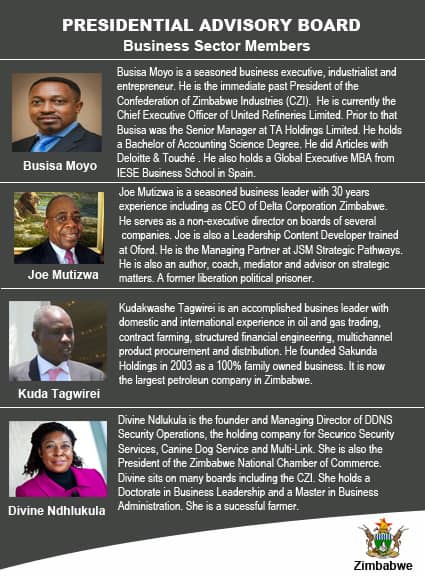By Christopher Makaza
Citizens from across the country have applauded President Emmerson Mnangagwa for setting up a 26 member Presidential Council that will advise him on economic matters in a bid to mend the ailing economy.
The Council which consists of some captains of industry and technocrats will serve as the President's sounding board on key economic reforms, issues and initiatives in line with the Vision 2030.
Cyber troll Sylet Chirwa posted, “With this sharp Advisory Council, Zimbabwe will reclaim its Africa's Jewel status very soon. I would like to congratulate all business luminaries appointed to the President's Advisory Council. I have faith that their measured advice to the President will steer the country away from economic challenges. This one is a business advisory council that will enable the president to tap into the talent and experience of business leaders. It also allows him to listen to their concerns for national building.”
Another troll, Ali Naka on his twitter page posted, “The 26 member Presidential Advisory Council appointed by President Emmerson Mnangagwa is the most progressive step the nation has taken since November 2017 events. If given space to do their work and ZIDA coming in place, Zimbabwe would be on a positive trajectory. Enough of MDC noise.”
Champion Lumumba posted, “Good move on the advisory council by President Mnangagwa particularly happy to see Trevor Ncube, Shingi Munyeza and Kudakwashe Tagwirei, however, youths and those from the informal sector were also supposed to be included.”
Congratulating Mr Munyeza on his appointment, MDC-T Spokesperson Linda Masarira tweeted, “Very Noble of him fixing Zimbabwe should be every Zimbabweans prerogative. Politics has destroyed this nation. It`s time people get out of the election mode and focus on reviving the economy for posterity. Well done Shingi Munyeza. I believe in your very able and capable leadership.”
The advisory council comprises experts and leaders drawn from diverse sectors like business, health and social protection, agriculture, governance and human rights, faith-based organisations, tourism, education, minorities, ICT, civic society, communication and media management.




